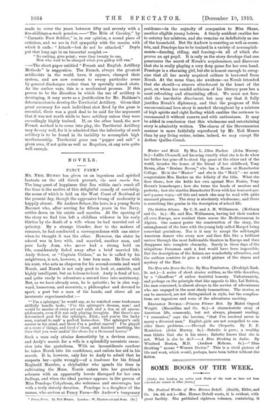NOVELS.
FANCY FARM.*
MR. NEIL Munn° has given us an ingenious and spirited fantasia on the old Greek proverb, lit, ,carh o•aurbv Act.
The long quest of happiness that lies within one's reach all the time is the motive of this delightful comedy of courtship, the scene of which is laid on the West Coast of Scotland at the present day, though the aggressive Wang of modernity is happily absent. Sir Andrew Schaw, the hero, is a young Scots Baronet who, after serving for fifteen years in the Navy, settles down on his estate and marries. At the opening of the story we find him left a childless widower in his early thirties by the death of a wife whom he had married out of quixoti7. By a strange blunder, dear to the makers of romance, he had conducted a correspondence with one sister when he thought it was the other. However, the sister he adored was in love with, and married, another man, and poor Lady Sean, who Bever had a strong hold on life, considerately faded away after a brief married life. Andy Schaw, or " Captain Cutlass," as he is called by his
neighbours, is not) however, a lone lorn man. He lives with his aunt, who acts as chaperon for his second-cousin and ward
Norah, and Norah is not only good to look at, amiable, and highly intelligent, but an heiress to boot. Andy is fond of her, and quite ready to adventure a second time into matrimony. But, as we have already seen, he is quixotic ; he is also way- ward, humorous, and eccentric, a philosopher and devoted to sport, a poet but a man of his hands, and above all an inveterate experimentalist :-
"° I'm a splairger,' he would say, as he watched some tradesman skilfully handle tools ; ' I've the splairger's dreams, man! and would be master of every art and craft and a don at all accom- plishments, even if it was only playing draughts. But there's nae determined goal for the splairger, Alic,k ; and you're the lucky man, content to male a perfect horse-shoe. The splairger's only master in his mind, and there I'm a perfect marvel ! I've played at a score o' things, and, tired o' them, and finished naething, the time that you were makin' the shoes for a thousand horses.' "
Such a man only attains domesticity by a devious course, and Andy's search for a wife is a splendidly eccentric excur- sion into the gratuitous. With an inconsiderate candour he takes Norah into his confidence, and enlists her aid in his search. It is, however, only fair to Andy to admit that he suspects her—quite wrongly—of a tendresse for his friend Reginald Maurice, a shipbuilder who spends his time in cultivating the Muse. Norah enters into her guardian's schemes with an apparently heroic disregard for her own feelings, and when the ideal partner appears in the person of Miss Penelope Colquhoun, she welcomes and encourages her with a truly sisterly devotion. Penelope is a daughter of the manse, who arrives at Fancy Farm—Sir Andrew's temporary
* Fancy Farm. By Nell Munro. London : W. black-wood and Sons. 93s.] residence—in the capacity Of companion to Miss Skene, another eligible young heireas. A timely accident enables her to outstay her mistress, and elle remains on indefinitely as one of the household. But Sir Andrew is exacting as well as eccen- tric, and Penelope has to be trained in a variety of accomplish- ments—dancing, riding, and fencing---4n all of which she proves an at pupil. It is only as the story deVelOps that one penetrates the secret of Norah's acquiescence, and discovers that she is really playing a very deep game for her own hand. Penelope is a charming girl, but She is honest enough to recog- nise that all her newly acquired culture is borrowed from Norah. At the tatne time, she awakens—as Norah intended that she should—a sincere attachment in the heart of the poet, on whom her candid criticism of his literary pose has a most refreshing and stimulating effect. We must not fore- stall the inevitable denotiment, hilt may say that it fully justifies Notah's diplomacy, and that the progress of this unconventional love story is marked throughout by a mixture of high spirits and right feeling which enables the reviewer to recommend it without reserve and with enthusiasm. It may be added in conclusion that this wholesome and entertaining story is admirably written. The charm of the Stevensonian manner is more faithfully reproduced by Mr. Neil Munro than by any living writer, unless, indeed, we may except Sir Arthur Quiller-Couch.


























































 Previous page
Previous page